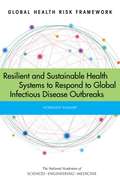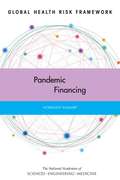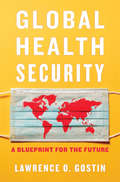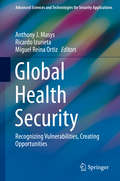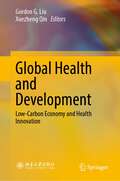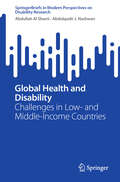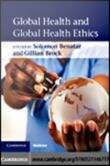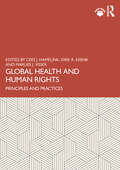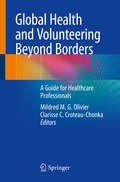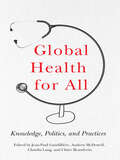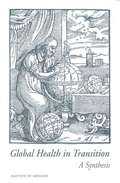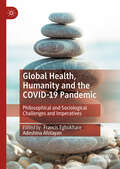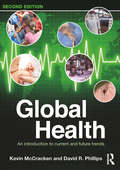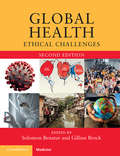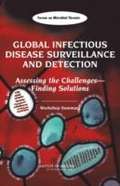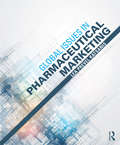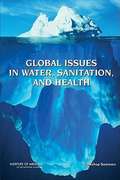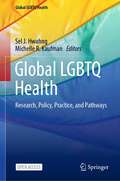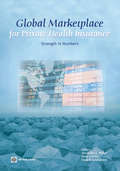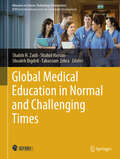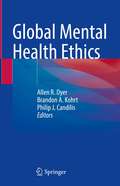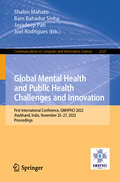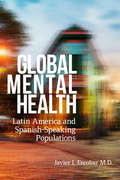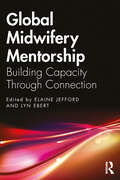- Table View
- List View
Global Health Risk Framework: Workshop Summary
by Engineering Medicine National Academies of SciencesSince the 2014 Ebola outbreak many public- and private-sector leaders have seen a need for improved management of global public health emergencies. The effects of the Ebola epidemic go well beyond the three hardest-hit countries and beyond the health sector. Education, child protection, commerce, transportation, and human rights have all suffered. The consequences and lethality of Ebola have increased interest in coordinated global response to infectious threats, many of which could disrupt global health and commerce far more than the recent outbreak. In order to explore the potential for improving international management and response to outbreaks the National Academy of Medicine agreed to manage an international, independent, evidence-based, authoritative, multistakeholder expert commission. As part of this effort, the Institute of Medicine convened four workshops in summer of 2015 to inform the commission report. The presentations and discussions from the Workshop on Resilient and Sustainable Health Systems to Respond to Global Infectious Disease Outbreaks are summarized in this report.
Global Health Risk Framework: Workshop Summary
by Engineering Medicine National Academies of SciencesSince the 2014 Ebola outbreak many public- and private-sector leaders have seen a need for improved management of global public health emergencies. The effects of the Ebola epidemic go well beyond the three hardest-hit countries and beyond the health sector. Education, child protection, commerce, transportation, and human rights have all suffered. The consequences and lethality of Ebola have increased interest in coordinated global response to infectious threats, many of which could disrupt global health and commerce far more than the recent outbreak. In order to explore the potential for improving international management and response to outbreaks the National Academy of Medicine agreed to manage an international, independent, evidence-based, authoritative, multistakeholder expert commission. As part of this effort, the Institute of Medicine convened four workshops in summer of 2015 to inform the commission report. The presentations and discussions from the Pandemic Financing Workshop are summarized in this report.
Global Health Security: A Blueprint for the Future
by Lawrence O. GostinWith lessons learned from COVID-19, a world-leading expert on pandemic preparedness proposes a pragmatic plan urgently needed for the future of global health security. The COVID-19 pandemic revealed how unprepared the world was for such an event, as even the most sophisticated public health systems failed to cope. We must have far more investment and preparation, along with better detection, warning, and coordination within and across national boundaries. In an age of global pandemics, no country can achieve public health on its own. Health security planning is paramount. Lawrence O. Gostin has spent three decades designing resilient health systems and governance that take account of our interconnected world, as a close advisor to the Centers for Disease Control and Prevention (CDC), the World Health Organization (WHO), and many public health agencies globally. Global Health Security addresses the borderless dangers societies now face, including infectious diseases and bioterrorism, and examines the political, environmental, and socioeconomic factors exacerbating these threats. Weak governance, ineffective health systems, and lack of preparedness are key sources of risk, and all of them came to the fore during the COVID-19 crisis, even—sometimes especially—in wealthy countries like the United States. But the solution is not just to improve national health policy, which can only react after the threat is realized at home. Gostin further proposes robust international institutions, tools for effective cross-border risk communication and action, and research programs targeting the global dimension of public health. Creating these systems will require not only sustained financial investment but also shared values of cooperation, collective responsibility, and equity. Gostin has witnessed the triumph of these values in national and international forums and has a clear plan to tackle the challenges ahead. Global Health Security therefore offers pragmatic solutions that address the failures of the recent past, while looking toward what we know is coming. Nothing could be more important to the future health of nations.
Global Health Security: Recognizing Vulnerabilities, Creating Opportunities (Advanced Sciences and Technologies for Security Applications)
by Anthony J. Masys Ricardo Izurieta Miguel Reina OrtizWith our highly connected and interdependent world, the growing threat of infectious diseases and public health crisis has shed light on the requirement for global efforts to manage and combat highly pathogenic infectious diseases and other public health crisis on an unprecedented level. Such disease threats transcend borders. Reducing global threats posed by infectious disease outbreaks – whether naturally caused or resulting from a deliberate or accidental release – requires efforts that cross the disaster management pillars: mitigation, preparedness, response and recovery. This book addresses the issues of global health security along 4 themes: Emerging Threats; Mitigation, Preparedness, Response and Recovery; Exploring the Technology Landscape for Solutions; Leadership and Partnership. The authors of this volume highlight many of the challenges that confront our global security environment today. These range from politically induced disasters, to food insecurity, to zoonosis and terrorism. More optimistically, the authors also present some advances in technology that can help us combat these threats. Understanding the challenges that confront us and the tools we have to overcome them will allow us to face our future with confidence.
Global Health and Development: Low-Carbon Economy and Health Innovation
by Gordon G. Liu Xuezheng QinThis book reviews the global preparedness to pandemic challenges to human health and development by compiling the brilliant ideas of experts and entrepreneurs from the fields of public health, health economics, environmental engineering, pharmaceutical interventions, and other related fields.This book proposes a collective effort to take pandemic prevention, preparedness, and response seriously and prioritize it accordingly to avoid the potential catastrophe in this inter-connected world by summarizing the lessons learned from the COVID-19. In the context of today’s climate change and its association with human health, the book presents the need for aligning climate and health goals and puts up with the multi-sectors and low-carbon economic strategies where health is prioritized in development.Furthermore, when more and more novel medical and pharmaceutical items worldwide are launched, the health system could be improved. With the help of digital health, artificial intelligence (AI), and other innovative forms of healthcare products, the efficiency and effectiveness of healthcare services provision could be promoted, leading to a more promising future for human health.This book vividly presents how such new technologies are applied to build an intelligent and robust health system and how innovations can be used to promote human health.
Global Health and Disability: Challenges in Low- and Middle-Income Countries (SpringerBriefs in Modern Perspectives on Disability Research)
by Abdullah Al Shami Abdulqadir J. NashwanThis book aims to shed light on the pressing and often overlooked challenges faced by individuals with disabilities in low- and middle-income countries (LMICs). The book explores how structural barriers, limited resources, and socio-cultural factors contribute to the inequities in access to essential services such as health care, education, and employment for this vulnerable population. Through a detailed analysis, the book highlights the disparities that exist between high-income countries and LMICs, offering insights into the unique obstacles that individuals with disabilities encounter in these regions. This book is of particular importance to the field currently due to the growing recognition of disability as a critical aspect of global health and development. The recent focus on inclusivity in global agendas, such as the Sustainable Development Goals (SDGs), underscores the need for a comprehensive understanding of how disability intersects with poverty, inequality, and access to essential services.
Global Health and Global Health Ethics
by Solomon Benatar Gillian BrockWhat can be done about the poor state of global health? How are global health challenges intimately linked to the global political economy and to issues of social justice? What are our responsibilities and how can we improve global health? Global Health and Global Health Ethics addresses these questions from the perspective of a range of disciplines, including medicine, philosophy and the social sciences. Topics covered range from infectious diseases, climate change and the environment to trade, foreign aid, food security and biotechnology. Each chapter identifies the ways in which we exacerbate poor global health and discusses what we should do to remedy the factors identified. Together, they contribute to a deeper understanding of the challenges we face, and propose new national and global policies. Offering a wealth of empirical data and both practical and theoretical guidance, this is a key resource for bioethicists, public health practitioners and philosophers.
Global Health and Human Rights: Principles and Practices
by Cees J. Hamelink Dirk R. Essink Marlies J. VisserThis textbook explores public health and individual health care through the prism of global human rights and ethical decision-making.Written by leading experts in this field, the book is divided into three distinctive parts. Part I introduces the theoretical framework through which the core issues can be understood, contrasting a clinical approach to health care with a social determinant perspective and discussing the decolonialisation of global health. Part II discusses how a human rights rationale impacts different social groups, from children to the elderly to those with disabilities, highlighting issues such as abortion and euthanasia. Part III addresses contemporary topics such as infectious diseases, migration, mental health care, the impact of advanced medical technology and climate change. Each chapter features case studies which ask readers to assess complex ethical dilemmas, fostering decision-making based on clear moral reasoning, as well as discussion assignments and further reading.Also featuring online video lectures, this is an important textbook that will be essential reading for students across the health sciences, including medicine and all related fields.
Global Health and Volunteering Beyond Borders: A Guide for Healthcare Professionals
by Mildred M. G. Olivier Clarisse C. Croteau-ChonkaGlobal Health and Volunteering: A Guide for Healthcare Professionals is designed to educate volunteers to be effective partners in delivering medical services locally and globally. Healthcare professionals are increasingly interested in global health and volunteering in areas of acute need. The biggest challenge to health in many locales is the inability to access the health care system. When people do connect with medical services, medications and surgical opportunities for chronic disease (i.e. glaucoma, diabetes, or hypertension) are often not affordable or cannot be sustained for a long period of time. The contributions in this book focus on a respectful dialog with local people and a willingness to learn from new experiences on the part of the volunteer. Skills transfer from visiting personnel to local providers is featured as a means to enhance healthcare sustainability. An appreciation of differing cultures, an understanding of the local economic conditions and challenges, and strategies for collaborating with the existing medical establishment are foundations of successful volunteer experiences as highlighted in this book. Dimensions of global health such as professionalism, religious beliefs, ethical dilemmas, traditional medicine, and alternative strategies for service are addressed by experts. Written and edited by leaders in the field, many of whom have more than two decades of experience volunteering abroad, Global Health and Volunteering: A Guide for Healthcare Professionals imparts lessons learned to help the reader avoid initial mistakes, while making the global health commitment stronger.
Global Health for All: Knowledge, Politics, and Practices
by Jean-Paul Gaudillière Christoph Gradmann Claudia Lang Laurent Pordié Claire Beaudevin Anne M. Lovell Andrew McDowell Olivia Fiorilli Lucile Ruault Caroline Meier Biesen Jessica Pourraz Vegard Traavik Sture Mandy Geise Sameea Ahmed Hassim Fanny Chabrol Simeng WangGlobal Health for All trains a critical lens on global health to share the stories that global health’s practices and logics tell about 20th and 21st century configurations of science and power. An ethnography on multiple scales, the book focuses on global health’s key epistemic and therapeutic practices like localization, measurement, triage, markets, technology, care, and regulation. Its roving approach traverses policy centers, sites of intervention, and innumerable spaces in between to consider what happens when globalized logics, circulations, and actors work to imagine, modify, and manage health. By resting in these in-between places, Global Health for All simultaneously examines global health as a coherent system and as a dynamic, unpredictable collection of modular parts.
Global Health in Transition: Perspectives from International Organizations
by John H. BryantInformation on the Transition in Global Health
Global Health, Human Rights, and the Challenge of Neoliberal Policies
by Chapman Audrey R.Written by a respected authority on human rights and public health, this book delivers an in-depth review of the challenges of neoliberal models and policies for realizing the right to health. The author expertly explores the integration of social determinants into the right to health along with the methodologies and findings of social medicine and epidemiology. The author goes on to challenge the way that health care is currently provided and makes the case that achieving universal health coverage will require fundamental health systems reforms.
Global Health, Humanity and the COVID-19 Pandemic: Philosophical and Sociological Challenges and Imperatives
by Adeshina Afolayan Francis EgbokhareThis volume interrogates global health and especially the scourge of the COVID-19 pandemic, and the role that science has played in mitigating the human experiences of pandemics and health over the centuries. Science, and the scientific method, has always been at the forefront of the human attempt at undermining the virulent consequences of sicknesses and diseases. However, the scientific image of humans in the world is founded on the presumption of possessing the complete understanding about humans and their physiological and psychological frameworks. This volume challenges this scientific assumption. Global health denotes the complex and cumulative health profile of humanity that involves not only the framework of scientific researches and practices that investigates and seeks to improve the health of all people on the globe, but also the range of humanistic issues - economic, cultural, social, ideological - that constitute the sources of inequities and threat to the achievement of a positive global health profile. This volume balances the argument that diseases and pandemics are human problems that demand both scientific and humanistic interventions.
Global Health: An Introduction to Current and Future Trends
by David R. Phillips Kevin MccrackenGlobal Health continues to provide readers with a comprehensive, up-to-date and thought-provoking outline and understanding of the constantly evolving global health landscape. In this new edition the authors have maintained the successful structure and organisation of the previous edition to examine and explain recent health changes and consider likely future patterns. New or expanded topics covered include: emerging and re-emerging infectious disease threats increasing awareness of, and interest in, antimicrobial resistance and superbugs terrorism, global conflict and health the new UN 2030 Agenda for Sustainable Development the drive for Universal Health Coverage (UHC) the use of information technology in global health substance abuse palliative and end-of-life-care ethical issues in global health. Using clear and original explanations of complex issues, this text makes extensive use of boxed case studies and international examples, with discussion questions posed for readers at the end of each chapter. Readers will also be able to take advantage of the new website that was designed to complement this book. Global Health is essential reading for students and researchers of global health, public health and development studies.
Global Health: Ethical Challenges
by Gillian Brock Soloman BenatarAddressing global health is one of the largest challenges facing humanity in the 21st century, however, this task is becoming even more formidable with the accelerated destruction of the planet. Building on the success of the previous edition, the book outlines how progress towards improving global health relies on understanding its core social, economic, political, environmental and ideological aspects. A multi-disciplinary group of authors suggest not only theoretically compelling arguments for what we must do, but also provide practical recommendations as to how we can promote global health despite contemporary constraints. The importance of cross-cultural dialogue and utilisation of ethical tools in tackling global health problems is emphasised. Thoroughly updated, new or expanded topics include: mass displacement of people; novel threats, including new infectious diseases; global justice; and ecological ethics and planetary sustainability. Offering a diverse range of perspectives, this volume is essential for bioethicists, public health practitioners and philosophers.
Global Infectious Disease Surveillance and Detection: Workshop Summary
by Institute of Medicine of the National AcademiesThe National Academies Press (NAP)--publisher for the National Academies--publishes more than 200 books a year offering the most authoritative views, definitive information, and groundbreaking recommendations on a wide range of topics in science, engineering, and health. Our books are unique in that they are authored by the nation's leading experts in every scientific field.
Global Issues in Pharmaceutical Marketing
by Lea Prevel KatsanisGlobal Issues in Pharmaceutical Marketing presents a balanced, research-based perspective combined with a practical outlook on the current issues faced by the ethical, biotech, and generic segments of the pharmaceutical industry. It integrates an analytical approach with a global view to examine such issues as market access, digital marketing, emerging markets, branding, and more. The book covers not only the North American and Western European markets, but focuses on non-Western markets, such as Latin America and Asia. Each chapter is written as an individual essay about a given issue, and where relevant, original cases are provided to illustrate how these issues are currently managed by the global industry. This book offers a thoughtful and thorough description of the industry’s current situation and integrates the latest scholarly and industry research from different disciplines in one place for convenient reference. It may be used in the following ways: To stimulate class discussions and inspire new streams of research for academics and graduate students; To introduce the industry to those interested in a career, to orient new industry hires, or to provide experienced practitioners with current research that will enhance their knowledge; To provide an understanding of the industry for those in the healthcare sector, such as physicians, pharmacists, as well as medical and pharmacy students; and To present recent and relevant research for those in government, public or private payers, and public policy environments to facilitate their decision making. This book will prove to be a useful resource and an important source of information for academics and their students, professionals, and policymakers around the world.
Global Issues in Water, Sanitation, and Health: Workshop Summary
by Institute of MedicineAs the human population grows--tripling in the past century while, simultaneously, quadrupling its demand for water--Earth's finite freshwater supplies are increasingly strained, and also increasingly contaminated by domestic, agricultural, and industrial wastes. Today, approximately one-third of the world's population lives in areas with scarce water resources. Nearly one billion people currently lack access to an adequate water supply, and more than twice as many lack access to basic sanitation services. It is projected that by 2025 water scarcity will affect nearly two-thirds of all people on the planet. Recognizing that water availability, water quality, and sanitation are fundamental issues underlying infectious disease emergence and spread, the Institute of Medicine held a two-day public workshop, summarized in this volume. Through invited presentations and discussions, participants explored global and local connections between water, sanitation, and health; the spectrum of water-related disease transmission processes as they inform intervention design; lessons learned from water-related disease outbreaks; vulnerabilities in water and sanitation infrastructure in both industrialized and developing countries; and opportunities to improve water and sanitation infrastructure so as to reduce the risk of water-related infectious disease.
Global LGBTQ Health: Research, Policy, Practice, and Pathways (Global LGBTQ Health)
by Sel J. Hwahng Michelle R. KaufmanThis open access book is a groundbreaking volume that creates a new field within the intersection of “global health” and “LGBTQ health” delineating specific health challenges and resiliencies. There has been increasing awareness of the importance in recognizing LGBTQ health issues and disparities. However, there is a dearth of research and scholarship that examines LGBTQ health through global and comparative perspectives. This book addresses this gap.In the pursuit of scientific inquiry, the disciplines in public health have often emphasized reductionist perspectives that are particularized to a specific locale, municipality, or country. This book's provision of broader perspectives, cross-cutting disparities and issues, and socio-political-cultural contextualization inform the development of new research, policies, interventions, and programs. Students benefit by learning about LGBTQ health research, policies, and programs in various countries and regions. Public health researchers benefit by learning about research conducted in various countries and regions, along with understanding how research has been linked to and impacted by various policies and programs. Policymakers benefit from learning about overarching and comparative perspectives that could inform more effective policies, including those connected to multiple locations. Practitioners learn about various public health practices in multiple countries and regions that could contribute to novel and creative solutions and approaches within the respective contexts. The nine chapters of this volume facilitate greater socio-political-cultural awareness, sensitivity, and competence; undertake an in-depth literature review of health factors and outcomes; and provide recommendations for increasing health-related capacity through development and collaborations between agencies, organizations, and institutions across countries and/or regions. Global LGBTQ Health: Research, Policy, Practice, and Pathways is primarily intended for students and instructors in public health, medicine, nursing, other health professions, psychology, social work, LGBTQ or gender/sexuality studies, human rights, and the social sciences. The book is also a useful resource for public health researchers and practitioners, policymakers, and healthcare and social service providers.
Global Marketplace for Private Health Insurance: Strength in Numbers
by Peter Zweifel Onno P. Schellekens Alexander S. PrekerFinancial protection against the cost of illness and inclusion of vulnerable groups - will require better mobilization and use of private means. Private voluntary health insurance already plays an important role in mobilizing additional resources to the health sector and protecting against the catastrophic cost of illness in some countries. This review explores the context under which private voluntary health insurance could contribute to an improvement in the sustainability of the health sector and financial protection in other countries.
Global Medical Education in Normal and Challenging Times (Advances in Science, Technology & Innovation)
by Shabih H. Zaidi Shahid Hassan Shoaleh Bigdeli Tabassum ZehraThis book is written by several medical educators from developed as well as developing countries based on decades of experience in teaching. The unique experience gained during the COVID-19 pandemic has added new dimensions to the traditional pedagogy, andragogy, and heutagogy, documented here. The salient topics include distance learning, virtual classrooms, virtual workshops on OSCEs, open book exams, micro-learning, micro-credentialing, blended or digitalized curriculum delivery, academic leadership, communication skills, professionalism, telemedicine, bioethics, cyber clinics, artificial intelligence, etc. This book is used as a text or reference book by physicians, teachers, scholars, students, and medical universities for teachers' training, capacity building, and guidance on fundamental pillars of cognitive domains of knowledge, skills, and attitude, as well as factual, conceptual, procedural, and metacognitive skills. It is also a source of guidance in faculty enhancement and toward continued quality improvement in medical education.
Global Mental Health Ethics
by Philip J. Candilis Allen R. Dyer Brandon A. KohrtThis volume addresses gaps in the existing literature of global mental health by focusing on the ethical considerations that are implicit in discussions of health policy. In line with trends in clinical education around the world today, this text is explicitly designed to draw out the principles and values by which programs can be designed and policy decisions enacted. It presents an ethical lens for understanding right and wrong in conditions of scarcity and crisis, and the common controversies that lead to conflict. Additionally, a focus on the mental health response in “post-conflict” settings, provides guidance for real-world matters facing clinicians and humanitarian workers today. Global Mental Health Ethics fills a crucial gap for students in psychiatry, psychology, addictions, public health, geriatric medicine, social work, nursing, humanitarian response, and other disciplines.
Global Mental Health and Public Health Challenges and Innovation: First International Conference, GMHPHCI 2022, Jharkhand, India, November 25–27, 2022, Proceedings (Communications in Computer and Information Science #2327)
by Shalini Mahato Bam Bahadur Sinha Jayadeep Pati Joel RodriguesThis book constitutes the refereed proceedings of the First international conference on Global Mental Health and Public Health Challenges and Innovation, held in Ranchi, Jharkhand, India, in November 25–27, 2022. The 7 full papers in this book were carefully reviewed and selected from 62 submissions. These papers focus on the Application of modern techniques, such as Internet of Things (IoT), Artificial Intelligence (AI), Machine Learning (ML), and Deep Learning (DL), to the current challenges in the field of Mental health and public health.
Global Mental Health: Latin America and Spanish-Speaking Populations (Rutgers Global Health)
by Stanley Nkemjika Humberto Marin Miwa Yasui Kathleen Pottick Ethan Pearlstein Maria Calvo Eduardo Padilla Marina Figueredo Aguiar Gabriel De Erausquin Carrie Bearden Carlos Lopez JaramilloGlobal Mental Health provides an outline of the field of mental health with a particular focus on Latin America and the Spanish-speaking world. The book details evidence-based approaches being implemented globally and presents ongoing state of the art research on major mental disorders taking place in Latin America, including work being done on understanding Alzheimer’s, Bipolar Disorder, Schizophrenia, and other psychoses. While supporting the initiative for building capacity of care in low income countries, the book warns about some of the potential risks related to the abuse of psychiatry, using examples from the past, focusing on early 20th century Spain.
Global Midwifery Mentorship: Building Capacity Through Connection
by Elaine Jefford Lyn EbertThe book begins by exploring the history of mentoring and its relationship to education and practice. Theories and models of mentorship, education and leadership within the context of midwifery will be discussed, along with the importance of critical thinking and reflection. The editors use the lens of global mentoring to focus on how mentoring in midwifery has developed and been implemented in 15 countries from North and Central America, Europe, Asia, Africa and Australasia. Each chapter explores regulation, professional accountability, education, leadership and career pathways in the country in question.This international text draws on the perspectives of Australian mentors, mentees, healthcare organisations and academics to highlight the complexities of mentorship in real work midwifery practice, and includes a chapter discussing how to take cultural considerations into question. The final chapters draw on the previous discussion to make recommendations that will support midwifery to implement and sustain a successful and supportive mentorship program for the next generation of midwives.In this book, authors often refer to midwives as women to reflect the gendered nature of subordination of midwifery. While most midwives globally are women providing care to women, not all midwives in Mexico or globally identify as women. We acknowledge and celebrate the diverse identities of midwives, as this is the best way to build an environment that guarantees enabling sexual and reproductive care for all people who need midwives. Further, the term First Nations which is used is a collective term that refers to Indigenous Australian and Aboriginal and Torres Strait Islander peoples of Australia. First Nations peoples will refer to themselves by any of these terms and may also identify through language groups. This term is used in acknowledgement that First Nations peoples have the right of self‑determination to identify however they choose to do so.This book is an invaluable read for midwifery students, educators and practitioners.
